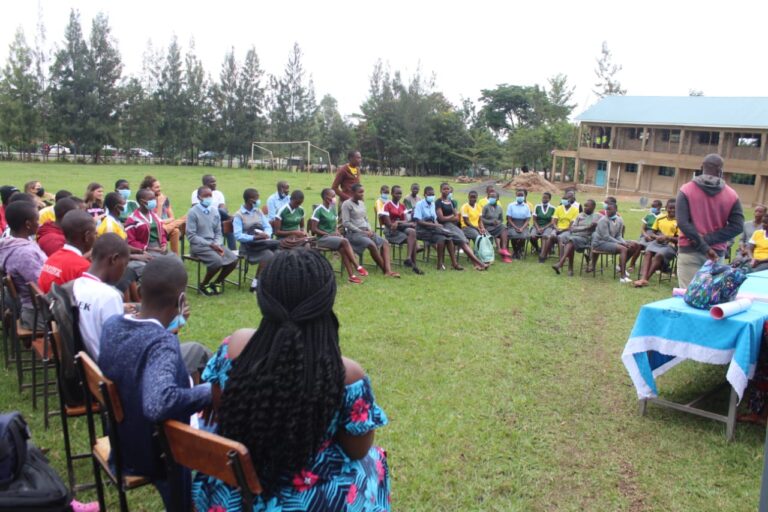High School Engagement in Menstrual Health and Sanitary Hygiene

Event Aim: Empowering young minds in addressing period poverty and promoting menstrual health
Date: November, 2021
Location: Kisiany Secondary School, Kisumu, Kenya
Introduction: The event aimed to empower young minds in addressing period poverty and promoting menstrual health. It was organized to educate high school students on sexual reproductive health, with a focus on menstrual health and hygiene. The initiative aimed to address period poverty by distributing sanitary products and providing essential education to young girls about managing their menstrual health with confidence and dignity.
Event Highlights:
Opening Remarks:
- The event began with a welcoming address by the school guidance and counseling teacher. She highlighted the importance of menstrual health education in fostering the well-being and academic success of female students.
Presentations:
Presentations were made by a team of experts in adolescent health from Fuzu Dada, TINADA, and WOVOP. The discussions touched on various sexual reproductive health issues including an insightful keynote presentation on menstrual health and hygiene. Key topics included:
- Understanding menstruation: the biological process and menstrual cycle.
- Importance of menstrual hygiene and best practices.
- Addressing myths and misconceptions about menstruation.
- Strategies for managing menstrual discomfort.
Interactive Workshops:
- Students participated in interactive workshops designed to engage them actively and provide practical knowledge:
- Menstrual Hygiene Management: This workshop covered the use of sanitary products, proper disposal methods, and maintaining personal hygiene during menstruation.
- Healthy Practices and Nutrition: Focused on dietary tips and exercises that can help manage menstrual symptoms and promote overall health.
- Empowerment and Self-Esteem: Aimed at building confidence and encouraging a positive body image among the girls, helping them feel proud of their bodies and their menstrual cycles.
- Sanitary Product Distribution:
- A highlight of the event was the distribution of sanitary products to all attending students. Each girl received a menstrual hygiene kit containing sanitary pads, a reusable menstrual cup, wipes, and an informational booklet on menstrual health and hygiene. This initiative aimed to tackle period poverty by ensuring that all students have access to necessary menstrual hygiene supplies.
Q&A Session:
- An open Q&A session provided students with the opportunity to ask questions and discuss their concerns about menstrual health. The facilitating team then offered clear, supportive answers, creating a safe environment for open discussion.
Resource Fair:
- Various booths were set up by local health organizations, offering additional resources and information on sexual reproductive health, menstrual health, and support services available for young women. Students had the chance to interact with representatives, collect educational materials, and learn about health services in their community.
Conclusion: ” Empowering young minds in addressing period poverty and promoting menstrual health” was a crucial step towards improving menstrual health education and addressing period poverty among high school students. By providing essential knowledge and resources, the event aimed to empower young girls to manage their menstrual health confidently and with dignity.
Impact and Future Steps:
- Increased Awareness: The event successfully raised awareness about menstrual health and hygiene, helping to dispel myths and reduce the stigma associated with menstruation.
- Empowered Students: Students left the event feeling more knowledgeable and equipped to manage their menstrual health, contributing to their overall well-being and academic performance.
- Continued Support: The organizers committed to sustaining the impact by planning regular follow-up sessions and ensuring ongoing distribution of sanitary products to students in need.
Feedback and Testimonials: Participants expressed their appreciation and highlighted the event’s positive impact:
“This event taught me so much about my body and how to take care of myself during my period. I’m grateful for the sanitary products we received.” – 17-year-old, Form Three Student
“The workshops were very informative and helped me understand that menstruation is a normal part of life. I feel more confident now.” – 14 year old, Form One Student
“I’m glad we had the chance to ask questions and get honest answers. It made me feel supported and less embarrassed about my period.” – 19-year-old, Fourth Form Student
Commitment to Continued Action: To ensure the event’s impact is lasting, the organizers outlined several follow-up actions:
- Regular Educational Sessions: Schedule regular sessions to continue educating students about menstrual health and hygiene.
- Peer Education Programs: Establish peer education programs where trained students can support and educate their peers on menstrual health.
- Sanitary Product Drive: Organize a drive to collect and distribute sanitary products regularly to ensure no student goes without necessary menstrual hygiene supplies.
- Partnerships with Health Organizations: Strengthen partnerships with local health organizations to provide ongoing support, resources, and educational materials to students.
Final Thoughts: This was a pivotal event in promoting the health and well-being of young girls. By addressing period poverty and providing comprehensive education on menstrual health, the event laid a strong foundation for future initiatives aimed at supporting and empowering female students. The commitment and enthusiasm shown by participants, organizers, and supporters will drive continued efforts to ensure that every girl can manage her menstrual health with confidence and dignity.

